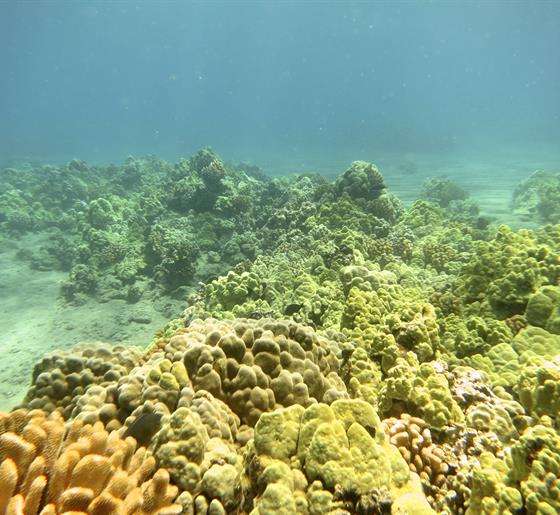Small-scale reef fisheries provide big benefits to people

A study published today showed that a single artisanal coral reef fishery can produce over 30,000 meals per year, with an annual economic value of more than $78,000. The study, published in PLOS ONE, was conducted in the Hawaiian bay of Kiholo by Conservation International, the Hui Aloha Kīholo—a community-based stewardship group—the National Geographic Society, The Nature Conservancy and the University of Hawai'i at Mānoa.
Ocean and coastal ecosystems bring a range of benefits to people worldwide, providing food and livelihoods to millions, but global and local stressors threaten these services. To better understand the benefits from ocean environments, the authors of this study investigated how an artisanal fishery supports a community, using a community-based approach to assess the factors affecting resource sustainability and food security in a small-scale coral reef fishery.
The authors found that the small-scale Kīholo Bay fishery provides large-scale benefits to communities. "This coral reef fishery generates diverse social, economic and cultural values, which support the health and well-being of the Kīholo community," said lead author Dr. Jack Kittinger, director of Conservation International's Hawai'i program. "These benefits are likely common to coral reef fisheries across the globe, supporting key food security functions, cultural practices as well as local livelihoods."
The results of the study suggest that similar coral reef fisheries around the world provide the same types of benefits to the people who depend on them.
The survey found that 58 percent of the caught seafood is kept for home consumption, 34 percent is given away and only 8 percent sold to commercial markets. "We found that the vast majority of the catch is kept for home consumption or given away as part of cultural practices, showing the important role that this bay plays in sustaining our community," said Jenny Mitchell, a board member of Hui Aloha Kīholo. "When Kīholo thrives, so do we."
By surveying fishermen for an entire year, researchers were able to estimate that the fishery produced more than 7,300 pounds of seafood per year for the community of people who rely upon the fishery. Nearly 60 percent of the catch is used for subsistence, contributing to community food security, and geographic analysis of community beneficiaries showed that 20 percent of seafood procured is used for sociocultural events that are important for social cohesion.
"By working with community fishers, we were able for the first time to map the distribution of benefits from a coral reef fishery, helping to understand the linkages between the ecology, food security and social networks—all of which are critical for sustainable management," said Dr. Alan Friedlander, a co-author of the study and chief scientist of the National Geographic Society's Pristine Seas project.
The community is already seeing benefits from the study, including increased willingness to engage among the fishing community, improved fishery knowledge and evidence of decreased illegal fishing.
"The participatory approach for this project—where the community took a lead role in the design, implementation and use of the findings, provides a model for conservation science," said Dr. Lida Teneva, science advisor for Conservation International's Hawai'i program. "By developing the project with community management priorities incorporated at the outset, the potential for this information to influence on-the-ground stewardship was embedded in the project."
The project demonstrates a transferable participatory research approach that resource-dependent communities can use to assess their reliance on—and benefits from—the environment. The cultural, social and economic benefits of coral reefs play a vital role in sustaining communities across the globe, and empowering community members to monitor the resources can play a significant role in supporting sustainable resource management and enhancing community food security.
Journal information: PLoS ONE
Provided by Conservation International



















